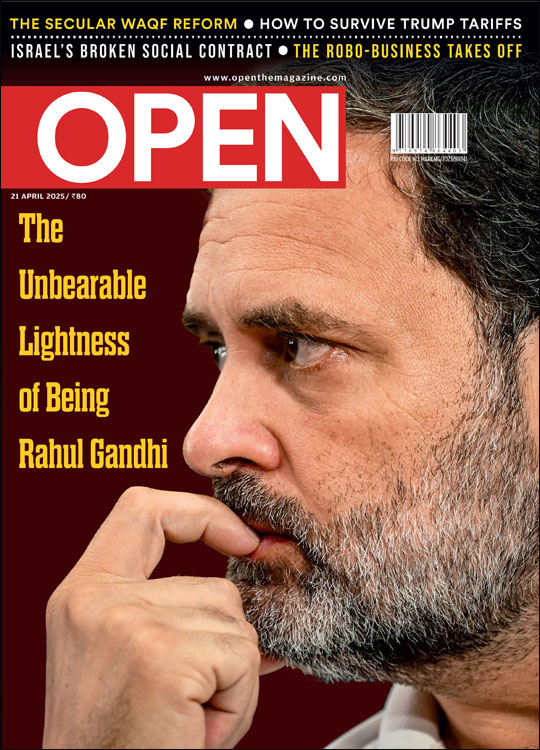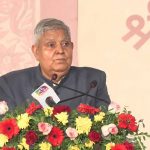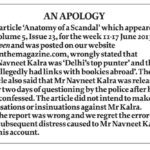AN INDIAN ORIGINAL
Aatish Taseer’s new novel is a modern classic on being Indian
 S Prasannarajan
S Prasannarajan
 S Prasannarajan
S Prasannarajan
 |
27 Nov, 2014
|
27 Nov, 2014
/wp-content/uploads/2015/11/Aatish-Taseer1.jpg)
Aatish Taseer’s new novel is a modern classic on being Indian
The word for history in Sanskrit is itihasa, the way things were. When, half way through Aatish Taseer’s new novel, Toby, Sanskrit scholar and classicist, gives us a little grammatic- al explanation of the word, it sounds as if the reader is being reminded of the historical as well as the civilisational backdrop against which the existential drama of the characters is being played out. Sanskrit—let’s ignore Smriti Irani for a while—here is language as ancestral intimacy, bonding and a memory of time, and in a novel that so effortlessly passes through the crooked alleys of Indian politics, it bridges the cracked present and the abandoned past. It is not that such authorial intervention is needed to sense the Indian ideal on which this novel, itihasa indeed in its structural expansiveness, is built. You may have to go back to his last two novels to realise how deep is Taseer’s entrapment in the idea of being Indian. In The Temple-Goers, this is what a writer who could have been Naipaul (and such a writer appears in The Way Things Were too) says about India: ‘In fact, it could be said that there is almost no other country, certainly not one so vast, where the countrymen are as acquainted with the distant reaches of the land through their pilgrimages as they are in India; perhaps no country where poor people travel more. They think nothing of jumping on a bus or train, for two or three days, to journey to Tirupathi in the south or Jagannath in the east. And this way, the religion itself is like a form of patriotism.’ The narrator of The Temple-Goers, daringly called Aatish Taseer, is in a constant struggle not to be an outsider in such a place caught between the temptations of modernity and the tensions of tradition, though his ways of being an Indian are more sophisti- cated. It is a journey of the classical mind. In his second novel, Noon, stretching from a Delhi where the stirrings of a national transformation are already discernible to a Karachi of morbid moralism, a personal quest becomes an interrupted meditation on cultural as well as political identity. The quest becomes bigger and more ambitious in his new novel; it becomes a passage to the deepest recesses of India of the mind.
It begins with a homecoming, a son’s return to India with his father’s body. It is a time when Modi is the conversation, and certain parts of Delhi, of Sunday brunches and lazy reminiscences, are kind of history- proof. For Skanda, a Sanskrit scholar, this journey is a foray into a world that shaped his own cultural sensibility— a world where, in another time, his parents were the leading protagonists in a drama in which the personal was played out on a political stage, beginning with the Emergency and ending with Ayodhya. What follows in a dual narrative is a family epic set in the upper class drawing rooms of Lutyens’ Delhi that, in its evolutionary spasms, turns into a dramatisation of the idea of India itself—its sophistication and its crassness, its perfections and its pathologies. And it is Sanskrit, an aesthetic shared by father and son, that magnifies the overwhelming sense of being Indian that runs through this novel. When I mention this to Taseer, he tells me: “I had been looking for that sense of Indianness for many years; and I found it in a strange way, through Sanskrit. I can still remember that morning, five or six years ago, when, at the Oriental Institute at Oxford (irony of ironies!) I read aloud my first ever words of Sanskrit: Brhad-asva uvaca. Brhadasva spake. Such a little thing—so commonplace in epics— but it went through me like a chill. I had the feeling of being spoken to over the ages. And the words, though simple, were full of Indo-European resonance, full of a shared history of sound and meaning: asva, cognate with the Latin equus, is related to such words as equerry and equestrian. And uvaca, the perfect form of the verb vac, to speak, is cognate with the Latin vox and vocare, from where we have words like voice and vocal. So, you see, even this little fragment, when unpacked, conveyed a sense of history. I didn’t know all this at the time, of course: I was simply responding with a child’s excitement to the sound of the language; but I must on some instinctive level have sensed its deeper resonance.”
It is Skanda’s father, Toby, half foreigner and the brainy Raja of Kalasuryaketu, who is the one who carries the resonance across the pages with the elegance of a renaissance mind. When we first meet him, he is delivering a lecture on the creation of poetry, dwelling on the rage and the subsequent sorrow of the first poet, Valmiki: ‘Known among poets as the adi-kavi—the first poet, a Sanskritic Caedmon, if you will—he is the first to recognise, twenty centuries ago, that, however much poets wish not to cause pain, there is no poetry without pain, no poetry without pity. And from here on, in the Indian imagination, soka—sorrow or grief—comes to be fused, both conceptually and phonemically, with sloka, poetry! It is this, and nothing besides, that we consider to be the birth poetry.’ This passage, in a way, summarises Toby’s own conversation with India—an idea that animates him, and a reality that crushes him. His story will turn out to be one of the romantic as outcast. This is the man who, on a drunken night in the Oberoi coffee shop, just after the Emergency was declared, climbs onto a table and announces a reward of £1,000 to any man willing to assassinate Indira Gandhi. In the closing pages, the falling mosque in Ayodhya demolishes an India he has all along been romanticising, an India shaped by his Sanskritic sensibility. ‘There was never a man who knew more about India and, yet, knew India less, than Toby. He was like one of those men who fall in love with the idea of a woman, while all the time insulating themselves from her reality.’ But his alternative is a beautiful state of mind, the poetics of the outsider- insider, a piece of classicism in a vastness of crassness. Says Taseer, “This tension between India, as idea, and India, the reality, is central to the novel. It comes up again and again, as does the question—so shrill in our times—of what really means to be Indian. Who has the monopoly on authenticity? Who is in possession of a true knowledge of the past?” This novel, Taseer tells me, “came out of a feeling of euphoria at the rediscovery of classical India in my own life.” Toby embodies this excitement. “Once he glimpses the genius of ancient India, he is never able to look at the modern country he sees around him in the same way again. The contact with the past transforms his relationship to what remains of old India in present- day India,” Taseer tells me.
The woman Toby seduces and then marries, Uma, brings the classicist closer to the possibilities of modern India. Uma, perhaps the most evolved character in the novel, is more than about the pleasures and privileges of Delhi’s original high society, which, by the way, provides some great set pieces choreographed with comic precision. In a novel of layered narrative architecture, she is the life force around which a family drama of elemental passions and epic humiliations unfolds. If memory is art’s alternative to history, the pages that capture the days of fear and hatred after Mrs Gandhi’s assassination are the testament of the living as a memorial service. It shatters the cosy certainties on which Uma’s family thrived for so long in a cosmopolitan city. The anti-Sikh Delhi riots of ’84 make Uma’s brother, the one who gets to read Toby’s mind correctly, an outsider. It is a protest and withdrawal when the brother abandons the city he thought was his. It was political violence that sets the marauders against the Sikhs. The writer of The Way Things Were is haunted by his political inheritance—Mrs Gandhi, the Delhi riots, Ayodhya… “How can I not be! The drama of these years—bookended by the Emergency and the demolition of the Mosque—is real. At home: the Emergency; Mrs Gandhi’s defeat and return to power; the creation of Bhindranwale; his death in Blue Star; Mrs Gandhi’s assassination. Abroad: Mullahs in Tehran; Soviet tanks in Kabul; Bhutto’s head in a hangman’s noose. The return of religion, of conservatism. Of Reagan and Thatcher. All this, and we are not even half way through! It was very near to me, you know: my father (the late Salman Taseer) was in jail under Zia, my mother (Tavleen Singh) was covering these things for the Indian papers. She was coming home with stories about what was happening. This was my direct material,” Taseer tells me. History, merciless elsewhere and redeeming in some places, is an echo, a flash and a rude intervention in this novel— it is the stylus that alters the script, as if she is the knowing child of destiny, taking everything in, and a part of her being incomprehensible to others. And others, in a Taseer novel,form a menagerie of types, caricatures and some originals, all at home in any high class Delhi drawing room.
So I ask Taseer: “Delhi of a certain vintage, its class mannerisms and attitudes, comes alive so naturally in your book. Memories of growing up?”
“It is hard for me to conceal my contempt for the people I grew up amongst. There was an outward veneer of sophistication about them, but it was very thin: they were in fact shallow and stupid people. Many of them went into politics. Some became chief ministers, one a prime minister, others senior ministers. And what did they do with their power? Absolutely nothing. They had seen the world when few could; they had been to the best schools; but none of it had any impact on them. They never tried to understand why some societies worked and others didn’t. They were disgusted by the people who had brought them to power. And they either left them roughly as they had found them or they looted them, squirrelling away money, diamonds, and flats in Knightsbridge. Nothing makes me happier now than to see that the age of this class of person is over. The drawing rooms of Delhi have been emptied of influence. And it’s a wonderful thing.”
“You get it so real. Reminds me of Rushdie’s Bombay.”
“Yes. This must be what Coetzee means when he says: ‘there is no mere landscape.’ Delhi, at some point, became a landscape of my imagination. It can happen. You mention Rushdie and Bombay; I can think of others. Bellow and Chicago, Joyce and Dublin. It takes a certain kind of city at a certain point in its development, doesn’t it? Delhi is definitely at that point. The little world that I grew up in—of privilege and influence—has been completely exploded, encircled, turned inside out. The cities within the city have been stitched together with infrastructure. A new urban whole has come into being. There are subcultures in Delhi; there are immigrants; there is something of an intellectual life. It’s quite a significant moment.”
“Do the people in your life, or people you know, always run the risk of getting into your books? I couldn’t help spotting a few here. “
“Apparently they live in mortal fear of that. But I don’t think I do it anymore than anyone else. I just get caught more often. No one should take it personally. It’s never out of malice, but out of curiosity and interest. And there is very rarely a direct match; more often than not there are multiple models for a single character. Only rarely does an old aunty get dragged off her sofa in Lutyens’ Delhi and thrown—Sikh husband, Marxist parents, great corpulence and all—headfirst into my novel without a paddle. But these are rare moments of playfulness.”
And Maniraja, businessman, political impresario, and Hindu nationalist, is a type. We can’t miss him. He is the man who replaces Toby in Uma’s life. Set against Toby’s passivity, what Uma thinks is the inherent weakness of an egghead, Maniraja is a man of action and volatility— and of kinetic vulgarity. It is always someone like Maniraja who finances the projects in civilisation. The debris of the demolished mosque in Ayodhya is the ideal foundation on which he will rebuild his civilisation. The two men in Uma’s life are two variations of India at play in this novel. There is nothing ‘practical’ or ‘sensible’ about the hopelessly romantic Toby. Maniraja is so fiercely confident that he can rebuild the India vandalised by the enemy—he believes in the brightest tomorrow. Even as Uma migrates from the sophistication of Toby to the brashness of Maniraja (Skanda’s Claudius), she keeps her ‘enigma’ intact—and she remains so till the last page. In a parallel narrative, Skanda, now immersed in his own love story featuring Gauri, a Delhi girl, becomes the living link between these two versions of India. Skanda is the child of memory, steeped in the knowledge that his ancestral story is the story of a nation as well. It is a “classic” novel, in true spirit of the world. “Yes,” says Taseer, “but it also subverts the traditional novel. There is a second narrative in the present, which acts almost like a framing device. There is quite an interesting variation from the idea of omniscience. Who is telling the story. Skanda is no Nick Carraway and yet he seems to be responding to the unfolding of the story. There is that pressure of the past against the present. This is what I was aiming for. I tried many times to write the story straight— an old fashioned novel set between 1975 and 1992— but I couldn’t. It was only when I found my frame—this thin, very still narrative in the present, under which the past seethes—that I was able to get my material to move.”
“In the end, India remains an argument unresolved, but you, as a writer trapped by her, have not abandoned hope. Have you?”
“Probably a lot of writers feel trapped by their place, doomed to certain material. I’m thinking of those frantic letters of Dostoevsky to various family members from Europe. ‘I must absolutely return to Russia’—he writes from Florence—‘here I will end by losing any possibility of writing for the lack of my indispensable and habitual material—Russian reality (which feeds my thoughts) and the Russians.’ I feel the pretty much the same way about India. It’s a difficult relationship, full of anxiety and frustration, but it feeds me as a writer. The West doesn’t work on me in the same way; I can’t read the faces; I can’t fill in the blanks; nothing suggests itself to me. In India I feel alive as a writer. It’s not about hope, really; it’s my place, that’s all.”
His words match his work, which is such a rare achievement in a place where the formulaic small novel is what makes the Indian imagination in English drearily provincial. Once in a while, an event breaks the idyll. The Way Things Were is one such event, drawing its power from an idea that never ceases to be a cultural astonishment— India. Aatish Taseer’s itihasa is one of India’s finest moments in fiction.
“It is hard for me to conceal my contempt for the people I grew up amongst. There was an outward veneer of sophistication about them, but it was very thin: they were in fact shallow and stupid people”
Full text of the interview with Aatish Taseer
From Open Archive: Aatish Taseer on learning Sanskrit
EXCERPT
The creation of poetry lecture was, half out of principle, half out of habit, always the first Toby gave on landing in India. He delivered it that June afternoon in Delhi at the India International Centre.
‘In his rage,’ Toby said, ‘Valmiki curses the hunter from Nishada. “Adharmo ’yam iti,” the twice-born sage says. “This is unjust. Since, Nishada, you have, at the height of your passion, killed one of this pair of kraunchas”— curlews!—“you shall not now live for very long.”
‘The curse of an angry sage,’ Toby continued, ‘is nothing we have not seen before in Epic. But what happens next is unprecedented: it is what makes this among the grandest openings to any work of literature. Because, within moments of uttering his curse, Valmiki regrets his terrible words. The question,’ Toby breathed, ‘is why? Why does the author of the Ramayana regret cursing the man from Nishada who, in killing the male of this pair of birds, has shattered his reverie and caused him such grief?’
The lecture came usually to Toby without mental effort; with such ease, in fact, that he feared he sounded mechanical. But that afternoon, despite the familiar subject and audience of friends, he was unable to concentrate. His gaze kept finding its way back to her.
And she seemed to notice. Her large liquid eyes seemed to return his look; there was a trace of movement in her lips.
‘We are not told,’ Toby said, trying hard to focus his thoughts, ‘Not told why he regrets his curse. But in what follows we are given an important clue. For, in the next instance, Valmiki utters what we consider to be the first verse of Indian poetry. “Fixed in metrical quarters,” the sage says, “each with a like number of syllables, and fit for the accompaniment of stringed and percussion instruments, the utterance that I produced in this access of soka, grief, shall be called sloka, poetry, and nothing besides.’”
Toby looked long at the audience, and, coming now to the end of his lecture, said, ‘He regrets his curse, I feel, because he knows that his grief at the killing of the bird—grief, he feels interestingly, not for the dying bird, but for its mate, the hen, whose song turns to a piteous lament—has set free his inspiration. It is the dirty secret of his art. Known among poets as the adi-kavi—the first poet, a Sanskritic Caedmon, if you will— he is the first to recognize, twenty centuries ago, that, however much poets wish not to cause pain, there is no poetry without pain, no poetry without pity. And from here on, in the Indian imagination, soka—sorrow or grief – comes to be fused, both conceptually and phonemically, with sloka, poetry! It is this, and nothing besides, that we consider to be the birth of poetry. ‘
In India, the use of English could, at times, come to feel like a performance in itself. People came to listen to it as people might come to listen to music in other places. In a country so accustomed to high languages, to benedictions and mantras, whose sound itself was beneficial, it was no great matter that not all of what Toby said was understood. It was a ritual. And once completed, the IIC intellectuals, with their yellowing beards and bad teeth, were keen, after a bit of late-afternoon English, to get on with the other elements of the ritual: the vote of thanks, the bouquet of gladioli, the tea and the samosas.
A few stayed behind to ask Toby questions. ‘But, Raja saab,’ one old man in a Himachali cap said, ‘you have said nothing about 1857?’
‘Should I have?’ Toby asked.
The man gave him a wink and a smile. An elderly lady, breathless from her walk up to the stage, said pointedly, ‘So, Mr Ketu, you have learnt Sanskrit then.’ This was not a question. And she seemed not at all uncomfortable by the silence it produced. An old bureaucrat, in beige and brown, cut in, with a burst of raucous laughter, ‘Well, Raja saab, the return of the native, eh?’
From out of this fusty crowd, Toby felt a hand, soft, dark and jewelled, clutch his. He knew immediately whose hand it was. But he caught only a glimpse of her. She was beautiful. Her eyes bigger, mistier and yet more melancholy than they had seemed from the stage. She had long black hair and was dressed in a green chiffon sari, with a single emerald edged with diamonds around her neck.
She said, ‘I hope I’ll see you later tonight at Bapa’s.’ Then—adding, ‘That was amazing, by the way’—she pressed his hand and withdrew quickly.
He was so overcome he had not been able to reply, and, when finally he was able to get away and go out to look for her, he was detained by an unusual man, a man who stood out at first glance.
Toby was in a hurry, but there was something arresting and assertive in how he had stopped him in his tracks and introduced himself in the corporate way, energetically shaking his hand while at the same time presenting his card. Toby at the time recalled thinking, This is someone completely new. The ring of Hessonite on his fingers, the little moustache, the slightly unhealthy pallor of skin, had all suggested one kind of person. But his careful, accented way of speaking, his beautiful clothes and shoes, and… and, well, his intensity, the fire in his eyes, singled him out, as someone who, in Toby’s considerable experience of India, was utterly unfamiliar.
And he seemed ready to assault Toby with his question: ‘The Ramayana, Professor Ketu, or should I say, Raja saab: what is it to you? Myth or history?’
Had Toby, in a hurry to find the woman in the green chiffon sari, answered this man’s sincere question with a fudge, an intellectual swipe? Perhaps. He had said, with a smile, ‘Why not stick with the Indic definition? Of Itihasa! Which is a compound, as you know, iti-ha-asa, and when broken down, means, literally, The Way indeed that Things Were. That covers everything: talk, legend, tradition, history…’
‘That’s very glib, Raja saab,’ the man said. ‘But that doesn’t answer my question, does it? Do you regard it as history, in the sense of it having all really happened, of Ram having really existed, or would you say it was myth?’
‘These things, especially in an Indian context, are not so easy to classify. And I’m not sure it’s so important…’ ‘Oh, it is important! If tomorrow you told a Muslim Muhammad did not exist, he would consider it important.’
‘What I was going to say was I’m not sure if it’s important for these things to meet a Western standard of what is historical or not. Which is maybe too limited for the Indian context. People, after all, have all kinds of ways of thinking about their past, and the important thing is to discover how they saw themselves, rather than how we see them today.’
It was an academic’s answer, and Toby’s interrogator sensed its safety. ‘Let me ask it more simply, Raja saab: do you, as a professor, believe that such a man as Ram ever existed, the way Jesus—’
‘Jesus is not a historical—’
‘OK, fine. Muhammad, Queen Elizabeth, Shakespeare… I don’t care. Do you believe that there was ever a king in India called Ram?’
‘There may well have been one. But no—by the standards you are applying, he is not historical. But neither, as you mentioned, is Jesus nor the Buddha—’
And here there was a crack in his interrogator’s composure. His eyes swelled round and white in his head; his lips trembled.
‘Buddha, Ram not historical? Shit Muhammad historical?’
Anger came now to Toby too.
‘What do you want me to say? Mr… Mr…’ He glanced at the card in his palm. ‘Why don’t you just come out with it?’ ‘You people, you have a full agenda. In league with those Islamic shits—’
‘You stop that. Don’t you dare use that kind of language—’
‘I suppose you’ll be saying next that there was no destruction of temples. Vijayanagara not destroyed. Vedic culture not Indian culture; the Aryans came from elsewhere. That’s what you want to say, no? India zero, a big fat anda? No?’
‘Vijayanagara,’ Toby said, interrupting firmly, ‘where, incidentally, I’m headed myself in a few days, was destroyed. And we know that because the Muslim historians, who you despise so much, have recorded it. As for the Aryan migration, which, if it occurred, occurred thirty-five centuries ago, you should ask yourself why it bothers you so much? What is this obsession in India with origins? This need to have people spring from the ground. Thirty-five centuries is a long time. Longer than the histories of Greece and Rome. Why is it in India alone that the mere suggestion that the Aryans might have come from elsewhere causes such discomfort? Can you tell me that, Mr—?’
Before he could look at the card, the man replied, ‘Yes, I can, Raja saab. I’m not …’ He hesitated; his lips were dry, a fragment of spittle clung to them, ‘I’m not afraid to take things head on. I can tell you just why. It’s because you….’ Here, again, he paused and—as if wanting, now at this bitter end of the conversation to make amends—took the trouble to correct himself. ‘They, the white man and the Muslim,’ he said, taking Toby by the hand with his two hands—not now the corporate shake—‘made us believe we have nothing of our own!’ Then, making to go, he added, ‘Raja saab, please: if I have said anything untoward, forgive me. And if I can be of any assistance to you at all, during your stay in India—these are delicate times!—do not hesitate to be in touch.’
With this, he swung round and vanished ahead of the small crowd of people leaving the IIC. Toby, seeing his card face down in his palm, turned it over. Mahesh Maniraja, CMD Mani Group. It was a name he would have cause to remember.
Evening fell. A queue – people clad in beige, cream and white, with the occasional green and red of a sari— formed before a table draped in satin; the clatter of crockery merged with the clamour of human voices, and the drone of insects. Toby knew a sudden feeling of confusion and melancholy.
The auditorium had been full of his friends but they were gone now. Only Tripathi, who had been with him since the airport that morning, when he landed from London, remained. He now approached.
‘Raja saab,’ he said, ‘your friends Mr Mohapatra and Gayatri madam told me to tell you to come this evening to Bapa saab’s in Sundar Nagar. They’re all having dinner there. They said they were sorry for having to run off in a hurry, but their father was among the politicians arrested last night, and there are a million things to be tended to.’
‘I know, I know. I was meant to be staying at Nixu Mohapatra’s house on Aurangzeb Road. He was going to give it to me for the summer, in return for my flat in London. But he’s not going to London now. It seems like everybody is here all summer.’
‘Have you made alternative arrangements?’
‘Yes. My friend Viski Singh Aujla is going to give me a discounted room at the Raj for as long as I like. Well, until, I finish my textbook, at least.’
Tripathi smiled, and, seeing some disappointment in Toby’s face, but unaware of its cause, he said, ‘I think everyone’s been a bit thrown off with this Emergency business. It’s all been very sudden.’
Toby feigned interest, but the antics of the modern Indian state left him cold. It was such an anxious and clumsy entity, now invading alpine kingdoms, now abolishing the princes, now spoiling the skylines of temple towns with concrete water tanks. Emergency, immujency, immjunsi. He had heard the word, fresh both in sound and meaning, ricochet around the city all day, acquiring new significance as it moved.
Driving in from the airport, he had seen sandbags in the shade of trees still festive from their May blossoming. In the dead white light of that June day, he saw men, Jats invariably, in olive-coloured uniforms, their handsome faces beaded with sweat, take their positions behind barricades. He had observed the blue metal barrels of guns cast their blank and cyclopean gaze over the still and scorching streets. It had been a day of stealth, and heat, and the crackle of radios, whispered conversations in darkened shops and houses. A day without news- papers, save for a few—where the government had forgotten to turn the power off.
‘Will it last long, Tripathi? This Emergency?’
‘Who can say, Raja saab? At the moment the elites are most affected, the newspapermen, the politicians. The public, the truth be told, are quite relieved. They feel there’ll be some proper governance for once.’
‘It’ll be bad in the long run, Tripathi, you watch. This kind of thing always is.’ They stood like that for a while, the occasional IIC member, tea and samosa in hand, giving a little bow or a smile as they went past.
Observing the descent of evening over the IIC, and the park at its rear, ornamented with tombs, Tripathi muttered, ‘Go-dhuli.’ ‘Yes!’ Toby said, feeling his spirits lift a little at this reference to the earth-dust hour, so resonant in poetry.
He had intended to say something about it in his lecture. But he had forgotten. Rifling through his reference cards, he handed Tripathi one dated 26 June 1975. Tripathi put on his spectacles and read aloud in a low murmur, ‘The majestic sun is setting bringing on gracious night… here, carrying their water pots, are the sages returning in a group … their bark-cloth garments soaked with water… the smoke, pearly as a dove’s neck, carried by the wind… the trees all about… seem to have grown dense; the horizons are all lost to view… ’
‘That is my India, Tripathi,’ Toby said, when Tripathi looked up. ‘A place of sages returning home in the evening, of smoke visible from their sacrifices; of trees filling, as they do here, with the sudden violet density of dusk. This, for me, is the real India, the India that lives on. Not this shabby Sovietic state the witch and her son want to shove down our throats. ‘
‘Careful, Raja saab,’ Tripathi said, and laughed. ‘You’ve only just arrived.’
‘The hell I care. By what I gather, I have more friends in jail than out. But, listen, Tripathi, we’ll have some good times together now that I’m here.’
‘Will you stay for a while this time?’
‘Maybe,’ Toby said with a grin. ‘Maybe for a long while.’ Then, recalling the secret cause of the elation he felt, he said, ‘Tripathi, tell me: did you see that lady sitting next to Isha Singh Aujla? The one in the green sari?’
‘Viski saab’s wife?’
‘Yes. No, I mean. Not her, but the one next to her.’
‘Her sister? Mishi madam, I think.’
‘Mishi? Is that her name?’
‘No. Uma, I believe. Odd choice of name for a Sikh girl. Punjabis, I tell you! They give a girl a name like Uma, then call her Mishi. Ishi and Mishi!’ Tripathi said and laughed. ‘Why? Some problem?’
‘No, no, nothing.’
(Excerpted from The Way Things Were by Aatish Taseer, Picador India, Rs 699, 565 pages)
About The Author
CURRENT ISSUE
The Unbearable Lightness of Being Rahul Gandhi
MOst Popular
3

/wp-content/uploads/2025/04/Cover-Congress.jpg)











More Columns
The Numbers Game V Shoba
MS Dhoni’s investment in Gensol suffers a blow amid financial scandal Open
Dhankar takes on judiciary over ruling on President powers Open